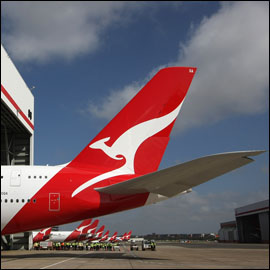IT services giant Unisys has confirmed it has won a lengthy deal to provide new baggage tracking systems for Qantas, after the pair’s relationship in a trial system was outed by the airline in July.
The system is part of what Qantas is calling its ‘Next-Generation’ check-in platform, made up of technology from 15 different vendors and involving the use of radio frequency identification tagging – RFID chips. Globally, airlines have long signalled the use of the chips attached to luggage as being the nirvana of baggage tracking, as the chips themselves can easily broadcast origin and destination information.
Under Unisys’ four-year deal with Qantas – revealed in a statement this morning – the IT services company will provide systems integration, implementation and rollout services to Qantas to support the Baggage Reconciliation System, as well as application hosting and support at Unisys’ Sydney datacentre.
The first stage of the rollout will see Qantas customers able to print out their bag tags (consisting of a barcade) at check-in kiosks before dropping off their bags. Qantas’ staff will then scan the barcodes to link the bags to passengers’ flight information. Passengers will also be able to purchase additional baggage allowances online at home – or when checking them in as usual.
However, perhaps the more exciting part of the rollout for technologists will be the rollout of what Qantas is calling its Q Bag Tag – a RFID chip which will be given to Platinum, Gold and Silver Qantas Frequent Flyer members. These passengers will be able to attach the chip to their bags instead of the barcode bag tag.
Qantas’ Next-Generation revamp also involves a number of other vendors – such as Fujitsu, Amadeus, Telstra and Satyam.
Unisys is hardly new to this kind of technology. In June 2009 it inked a five-year, $25 million contract renewal with the Board of Airline Representatives in Australia, which represents some 44 international airlines in Australia.
The IT services company is providing network and security infrastructure as well as help desk support for BARA’s own baggage reconciliation system, which also uses a barcode.
In addition, its new deal with Unisys may also give the IT services giant some satisfaction for another reason. In May 2009, the company lost out to rival Fujitsu in an extensive, $200 million contract to support the airline’s desktops. Fujitsu is also involved in Qantas’ Next-Generation overhaul – but, according to reports, its role may be more minimal, supplying handheld scanners and other peripherals to the project.
Image credit: Qantas

